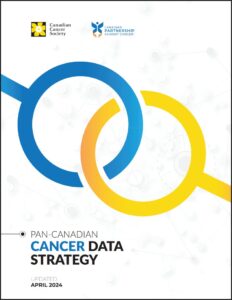2024-25 Annual report
Improving care through data, innovation and equity
A high-performing cancer system depends on strong data foundations, meaningful collaboration and the ability to adapt and evolve. This year, CPAC deepened its investment in these building blocks by modernizing data systems, advancing equity-driven measurement and creating the conditions for smarter, more sustainable cancer care across Canada. CPAC was able to accelerate its work in this area, delivering greater progress than originally planned.
Transforming cancer care through better data
This year marked a major expansion of the pan-Canadian Cancer Data Strategy, with nearly $14 million invested in initiatives to improve how cancer data is collected, integrated and used to support decision-making. Through strong demand from partners – 35 new agreements with 10 provinces and nationally – CPAC helped accelerate data modernization, equity-focused reporting and First Nations, Inuit and Métis-specific data and data governance.

Using AI to speed up cancer case reporting
In cancer registries across the country, processing delays can stretch up to three years, limiting the ability to evaluate whether new interventions like lung screening are working. CPAC is helping reduce this gap by supporting the use of artificial intelligence (AI) and natural language processing to automate cancer case identification and staging.
In British Columbia, integrating AI to auto-code just five disease sites saved an estimated 1,000 hours of manual coding and 2,000 hours overall in cancer registry operations, freeing clinical resources for more complex tasks. CPAC is funding four jurisdictions to implement similar AI solutions with projected savings of 48,000 hours per year, and three more jurisdictions are in the early planning stages to assess the feasibility of implementing this kind of technology. Faster data reporting enables health systems to act more quickly – for example, by assessing whether new screening initiatives are shifting cancer detection from later to earlier stages.
AI-driven cancer case identification saved 2,000 hours in cancer registry operations in British Columbia.
Harmonizing radiation treatment data
Treatment data is often recorded inconsistently within and across jurisdictions, creating barriers to seamless care. CPAC, with support from the Canadian Association of Provincial Cancer Agencies, is funding partners, including the Canadian Partnership for Quality Radiotherapy and Canadian Artificial Intelligence and Big Data in Radiotherapy Alliance, to implement international standards for radiation therapy data.
Implementation tools and auditing frameworks are now being deployed in cancer centres in Ontario and Nova Scotia to improve continuity of care. This standardization is critical for ensuring continuity of care, particularly for patients who may need to receive treatment in different facilities or jurisdictions. Harmonized data will also help strengthen the resilience of systems in the event of disruptions such as cyberattacks, ensuring patients can continue treatment without delay.
Advancing equity and reconciliation through better data
CPAC continues to support jurisdictions in collecting more inclusive data, which is essential for identifying disparities in cancer outcomes and improving care for equity-denied populations:
- Prince Edward Island is establishing policy, implementing a governance framework, and identifying a data system to support the safe and appropriate collection, storage, and use of data on racialized and ethnic groups.
- Manitoba is scaling up the collection of data on racialized groups, ethnicity and Indigenous identity across its cancer system following successful implementations in cancer screening and other parts of the healthcare system.
- Ontario is working to implement and sustain an Indigenous data governance process that will uphold First Nations, Inuit, Métis and Urban Indigenous data sovereignty at Ontario Health.
- Saskatchewan is enhancing data linkages to advance Peoples-specific, self-determined priorities for cancer surveillance and reporting.
Following Canada’s first-ever Cancer Equity Measurement Forum in October 2023, CPAC worked with partners this year to embed equity-focused performance indicators into national reporting frameworks. These efforts will help identify disparities in cancer care access, experiences and outcomes, and drive targeted policy interventions.
CPAC is also investing in partners’ capacity to analyze and apply data effectively by supporting the transition to open-source software, strengthening analytic skills and creating opportunities to share insights across jurisdictions. The System Performance Steering Committee advanced work on new indicators, and a national webinar series supported knowledge sharing on cancer data improvements and privacy solutions.
In collaboration with the Canadian Cancer Society and other partners, CPAC also supported community of practice meetings to strengthen cancer data strategy implementation at the local and national levels.
Benchmarking performance internationally
To support continuous learning and improvement, CPAC facilitates Canadian participation in the International Cancer Benchmarking Partnership (ICBP) and some jurisdictions are contributing to a new Organization for Economic Cooperation and Development (OECD) cancer report. These initiatives enable Canada to compare cancer outcomes, models of care and diagnostic pathways with those of other countries, helping identify where we are leading and where there are opportunities for further progress.
Go to the next section: Looking ahead
